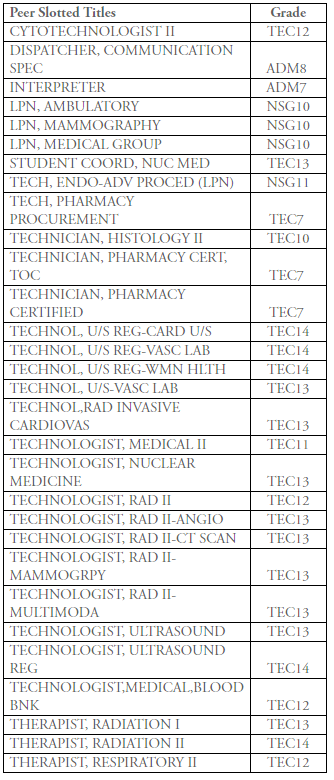Click here to see the current SHARE pay scales. Read on to learn about how to calculate your raise and about our peer slotting and platform system.
Raises and Platforms
Each SHARE grade has a minimum, a maximum, a series of platforms between the minimum and the maximum, and a max cap. Some grades (NSG10, NSG11, TEC12, TEC13, and TEC14) do not have platforms until 10/1/2017. The following table outlines how to calculate your raise within your grade.
Slotting and Peer-Based titles
As part of contract negotiations, SHARE and UMass Memorial agreed to slotting pay by experience for SHARE members in certain titles (called peer-based titles). In 2017, through the slotting process, we confirmed the years of experience of those affected and UMass adjusted their pay accordingly. If you were not in one of these titles, you were not affected.
What is the purpose of slotting?
The goal is to increase both equity and transparency. SHARE and UMass Memorial have negotiated platforms for each pay grade, based on years of experience. Anyone in a peer-based title who was still below the right platform, after their raise, got an additional raise to bring their pay up to the right platform. New employees will also be hired onto the scale based on their experience. Everyone will be able to see what the scale is and where they are on it. We have been working toward this goal for several years, and we are very proud of our agreement.
What are the peer-based titles?
The table to the right lists the peer-based titles that were newly added in 2016.
About 20% of SHARE members are in a peer-based title. In a previous contract, the other 80% of SHARE members had their pay slotted -- they got raises to put them on platforms if they were too low for their years of experience. On October 1, 2017, SHARE members in the peer-based titles who were too low for their years of experience got raises to put them on the correct platform.
Why were peer-based titles treated differently than other titles?
They are jobs that had their pay rates adjusted for equity many years ago, because the hospital was having trouble hiring and keeping people in these titles. Each title got its own pay scale. In 2008, we created pay scales with platforms for all the other jobs in SHARE. The platform-based system we created has been working well, so we have moved to using it for all SHARE members.
Who got an additional raise?
All SHARE members got their contractual raise October 1, 2017. Some people got an additional slotting raise, but most people were not affected by the slotting.
- Anyone in a peer-based title who was below the right platform got an additional raise to bring their pay up to the right platform.
- Most people in the peer-based titles were already at or above their platform – they were not affected. No one’s pay went down through slotting.
- Anyone who was not in a peer-based title was not affected because their titles were already platform-based.


